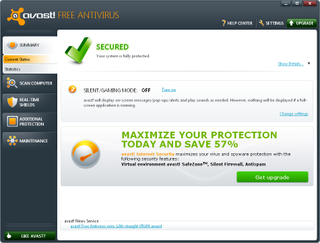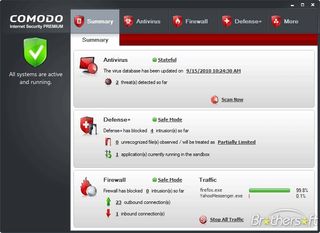Free and Open Source Software Alternatives
For every paid software application or suite, there's a free but capable alternative. Whether you're looking for photo editing software or an office suite, here are some open source and free alternatives.
Antivirus and Security
You don’t have to keep paying every year to stay protected from viruses, hacking, and other security threats. There are numerous antivirus and Internet security programs out there that are completely free. Here are a few to consider:
avast! Antivirus: Includes virus, spyware, and rootkit protection. Monitors network and Internet traffic to catch infections before they hit the computer. The auto sandboxing feature automatically runs unknown files in a virtual environment so no damage can be made. Plus, a boot-time scanner can run before Windows loads to remove stubborn infections. Avast! also includes site blocking, email alerts, and password protection.

Comodo Internet Security: Includes virus, spyware, rootkit, bot, and firewall protection. The Defense+ feature shields system files and the auto/manual sandboxing runs untrusted files in an isolated environment. To keep your websurfing safe, auto website filtering blocks known dangerous sites. Comodo also includes advanced customizable polices, configuration management, and password protection. Unlike most other free antivirus programs, this is available for businesses in addition to consumers.

AVG Antivirus Free Edition: Includes virus, spyware, and rootkit protection. The link scanner displays safety info about links before you click, while the desktop gadget and browser toolbar offer shortcuts and status info.

Most free security software lacks some of the features found in the commercial products, such as spam filtering and a firewall to stop intrusions. But spam filtering is usually offered by email providers and/or the email client software. For the firewall you can use the free Windows Firewall utility, which is included and active by default with all new copies of Windows.
Remember, educating yourself and being careful is just as important as running security software. Here are a few tips:
- Don’t open any attachments from strangers or even your friends if it looks suspicious.
- Don’t use links from emails; visit their websites directly.
- Verity any virus alerts you receive are coming from your installed utility and not a fake program.
- Remember to keep Windows and your security software updated.
Sign up to get the BEST of Tom's Guide direct to your inbox.
Get instant access to breaking news, the hottest reviews, great deals and helpful tips.
Current page: Antivirus and Security
Prev Page Free and Open Source Software Alternatives Next Page Office and Email-
army_ant7 You forgot to mention Microsoft Security Essentials. It's worth mentioning because it's actually supported by Microsoft and it's free (as long as you have a genuine OS). :-DReply -
army_ant7 LibreOffice would've probably been more welcome here than OpenOffice (because it's actually open source). :-)Reply -
army_ant7 I was wondering that to, but I'm really not familiar with Glary. It didn't even show up when I Googled for a free optimization utility before. I use CCleaner now though.Reply
Also, in the backup section, the Windows bacup tools aren't mentioned. -
army_ant7 I'm glad to see that last line of this article. It's very refreshing to read it and know that there are actually people out there who care. :-)Reply -
The author of this articles confuses open source and free software.Reply
try wikipedia for the definitions
True most open source is free (not all opens source is free). In this article I see mostly closed source free software.
Change the article title cause it is misleading (or change job) -
egeier Yes Ccleaner, Libre Office, and Microsoft Security essentials are good options too. Just didn’t want this to be a laundry list of software. I wanted to give some details about each and couldn’t do multiple alternatives for each category.Reply
Only gripes I have about Microsoft Security Essentials is that it lacks sandboxing and password protection. But I do like they offer it to small businesses for free as well, on up to 10 PCs.
Does CCleaner support batch uninstall? I love that in Glary Utilities. Also Glary offers the simple 1-Click Maintenance and seems to include a bit more additional tools than CCleaner: file shredder, undelete file recovery, file encryption, disk analysis, duplicate file finder, and file splitter and joiner. -
Tomsguiderachel nobody123456The author of this articles confuses open source and free software.try wikipedia for the definitionsTrue most open source is free (not all opens source is free). In this article I see mostly closed source free software. Change the article title cause it is misleading (or change job)Nobody--Reply
Thanks for your comment. Your point is a good one and we are looking in to a more appropriate descriptor for the applications discussed in this article. Some of these apps do not meet the criteria for the literal definition of "open source" which we would do well to adhere to. Keep an eye out for the headline change and our editor's update/correction.
Luckily, we're glad to take your advice about the definition of open source, but not insecure enough to change careers on your suggestion that we do so.
Thanks for reading.
Rachel Rosmarin
Managing Editor, Tom's Guide -
phate LibreOffice >>> OpenOfficeReply
http://arstechnica.com/open-source/news/2011/04/oracle-gives-up-on-ooo-after-community-forks-the-project.ars
Open Office is dead.
